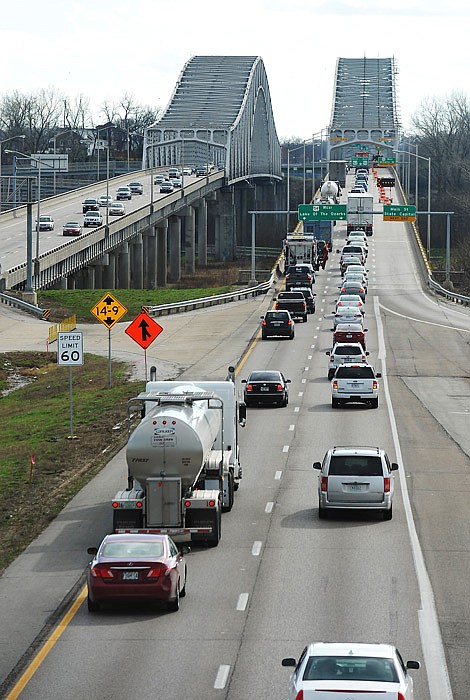In the distant future, autonomous vehicles could roam Missouri's roads and a hyperloop could transport riders across the state in just a matter of minutes.
First, state business leaders said, the state must invest in more basic needs like replacing outdated bridges for conventional cars and making repairs to Interstate 70.
The Missouri Chamber of Commerce and Industry held its annual transportation summit Thursday in Jefferson City to discuss transportation and infrastructure issues facing the state. While stakeholders from economic development groups dreamed of futuristic technologies, state leaders said basic needs must be paid for first.
The Missouri Department of Transportation faces a budget shortfall of about $825 million per year. MoDOT Director Patrick McKenna said with the department's $2.3 billion budget, MoDOT can fund many projects but can't fund smaller projects and experimental projects because of the shortfall.
"We could fully reconstruct I-70 over a five-year period," McKenna said. "But we'd put not a shovel full of asphalt anywhere else in the state."
Each month, motorists in Missouri pay $20-$30 each into improvements for roads through the state's fuels tax. McKenna said the cost of simply maintaining existing roads and bridges without building improvements is $172 per motorist per month.
In January the U.S. Chamber of Commerce outlined a four-pronged plan to improve the nation's infrastructure. The plan included a proposal to raise the federal fuel usage tax by 25 cents to 49.4 cents per gallon of gasoline.
Ed Mortimer, director of transportation infrastructure at the U.S. Chamber of Commerce, said this equals about $9 more per month Americans would pay. The proposal also includes a tax on alternative forms of energy for automobiles because of the expected growth of electric, hydrogen-powered and other alternative fuel cars.
"We're willing to invest in infrastructure because we see the economic return of having modern infrastructure," Mortimer said.
Every penny the fuels tax goes up raises about $7.8 billion in revenue, Mortimer said. McKenna supports this proposal and thinks the state must find other ways to close the gap in MoDOT's budget.
The event touched on topics such as improvements to ports throughout the state and ways infrastructure can be built in rural areas.
President Donald Trump announced plans Feb. 12 to spend $200 billion in federal money on infrastructure projects around the country. Of that money, half will fund grants to build projects around the country. The White House hopes the grants, which can cover no more than 20 percent of projects' costs, will spur as much as $1.5 trillion in spending on infrastructure projects nationwide.
Dan Mehan, president of the Missouri Chamber of Commerce, said attendance at Thursday's conference got a boost from a spike in interest after the president's announcement. Mehan said infrastructure issues relating to roads, bridges and even rural broadband infrastructure are a critical part of economic development.
Mortimer said the White House plan likely will change in Congress, but the plan intends to shift a large portion of funding for infrastructure projects onto states.
McKenna said MoDOT ranks No. 46 nationally in transportation funding.
"We've fallen behind as a state," Mehan said. "It's time that we invest in that critical need."
State leaders want to be proactive.
A coalition of government and business groups announced a plan in January to conduct a feasibility study exploring the possibility of building a hyperloop from Kansas City to St. Louis. The proposed 240-mile hyperloop track would follow the path of I-70 across Missouri and feature a stop in Columbia.
If built, the track plan hopes to get ferry riders from Kansas City to St. Louis in just 25 minutes at 671 mph. Hyperloops use magnetic technology similar to a monorail, but in an airless pipeline.
The project is likely years or decades away from being built. Andrew Smith, vice president of entrepreneurship and innovation at the St. Louis Regional Chamber, said it could lead an economic boom for Missouri because it would connect its two largest cities.
"It is impossible to overstate the impact that would have for regional commerce," Smith said.
Autonomous vehicles and electric vehicles also could fill Missouri's roads soon. About 80 percent of cars on the road could be autonomous by 2050, said Leighton Yates, senior manager of State Affairs for the Alliance of Automobile Manufacturers.
Trey Davis, president of the Missouri Energy Development Association, said the state also lacks charging stations for electric cars.
To help electric cars spread, the state, its utilities and its businesses must build more charging ports. By 2025, 7 million electric cars could be on the road, and they will need 5 million electric charging stations, Yates said.
Yates said Missouri must be proactive and build infrastructure for electric cars.
"We're very good at being reactive and not proactive in this state," Yates said. "That's got to stop, or we're going to be behind the 8-ball again."

